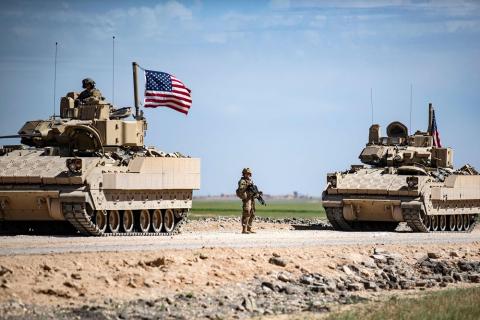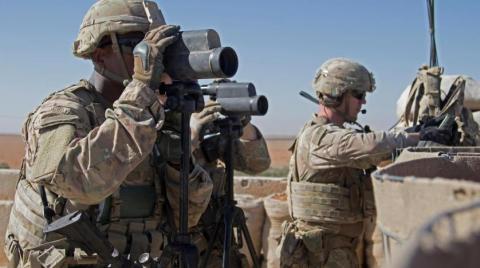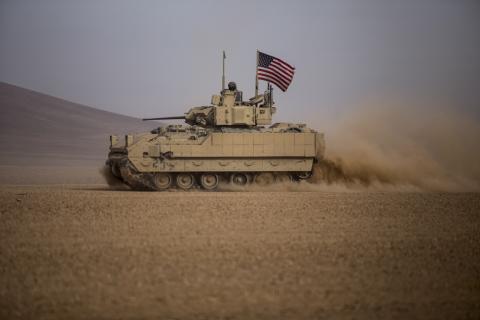
ISIS may stand alone in its brutality in Iraq and Syria, where it orchestrated civilian massacres and suicide bombings and salted people’s homes with thousands of improvised explosives. But a new report, three years in the making, describes the group as shrewd manufacturing and logistical planners who moved weapons, munitions and bombmaking materials throughout the war zone on a scale unprecedented for a terror organization.
Conflict Armament Research (CAR), a weapons-tracking group based in Britain, documented more than 40,000 firearms and munitions across Iraq and Syria by dispatching field investigators in an arc stretching from the northern Syrian city of Kobane to south of Baghdad, Iraq’s capital — a rough tracing of ISIS path to conquer wide swaths of territory and establish its caliphate.
The report, which the researchers call the most comprehensive to date about how ISIS obtained and fielded its weapons, was published Thursday and could become a vital tool for understanding the terror group’s deadly industrial proficiency. Here are a few takeaways:
ISIS used rockets supplied by the United States — possibly in violation of agreements with weapons makers
As The Washington Post reported in July, the Trump administration ended a secretive CIA operation to arm moderate Syrian rebels battling Bashar al-Assad. Few details on what arms they received are known publicly, but researchers found numerous rockets in Iraq that appear to have been purchased by the United States and supplied to Syrian groups.
In one instance, PG-9 73mm rockets, sold by Romanian arms manufacturers to the US Army in 2013 and 2014, were found sprinkled across both battlefields. Containers with matching lot numbers were found in eastern Syria and recovered from an ISIS convoy in the Iraqi city of Fallujah, the report says. The rockets, adapted by ISIS to use in their launchers, gave militants a potent weapon against US-supplied tanks and armored Humvees.
Records obtained by CAR from Romanian officials include agreements indicating the United States would not re-export those and other weapons, part of an effort to curb weapons trafficking. Saudi Arabia was another source of unauthorized weapons transfers to Syria, the report says.
As The Washington Post reported in July, the Trump administration ended a secretive CIA operation to arm moderate Syrian rebels battling President Bashar al-Assad. Few details on what arms they received are known publicly, but researchers found numerous rockets in Iraq that appear to have been purchased by the United States and supplied to Syrian groups.
In one instance, PG-9 73mm rockets, sold by Romanian arms manufacturers to the US Army in 2013 and 2014, were found sprinkled across both battlefields. Containers with matching lot numbers were found in eastern Syria and recovered from an Islamic State convoy in the Iraqi city of Fallujah, the report says. The rockets, adapted by ISIS to use in their launchers, gave militants a potent weapon against US-supplied tanks and armored Humvees.
Records obtained by CAR from Romanian officials include agreements indicating the United States would not re-export those and other weapons, part of an effort to curb weapons trafficking.
CAR’s report says the US government did not respond to requests to trace this and other weapons documented by its researchers.
In a statement to The Washington Post, Defense Department spokesman Eric Pahon did not dispute reports of US-provided weapons recovered by ISIS militants. “Wherever possible,” he said, “our advisers will monitor the use of the weapons and supplies we give the [Syrian Democratic Forces], ensuring use only against ISIS. Any alleged misuse or diversion of US support will be taken seriously and lead to the possible curtailment of support, if verified.”
It took only weeks for the Islamic State to get its hands on US antitank missiles
On Dec. 12, 2015, Bulgaria exported antitank missile launcher tubes to the US Army through an Indiana-based company called Kiesler Police Supply. Fifty-nine days later, Iraqi federal police captured the remains of one such weapon after a battle in Ramadi, Iraq, the report says. In another instance, a US-backed rebel group in Syria was photographed using a launcher tube with an identical lot number, indicating it probably came from the same batch, the report says.
The episode illustrates how quickly US-supplied arms can be turned against its allies, reshape a battlefield and pose danger to the small teams of US Special Operations troops who routinely travel in vehicles that aren’t made to withstand antitank weapons.(The Washington Post)











